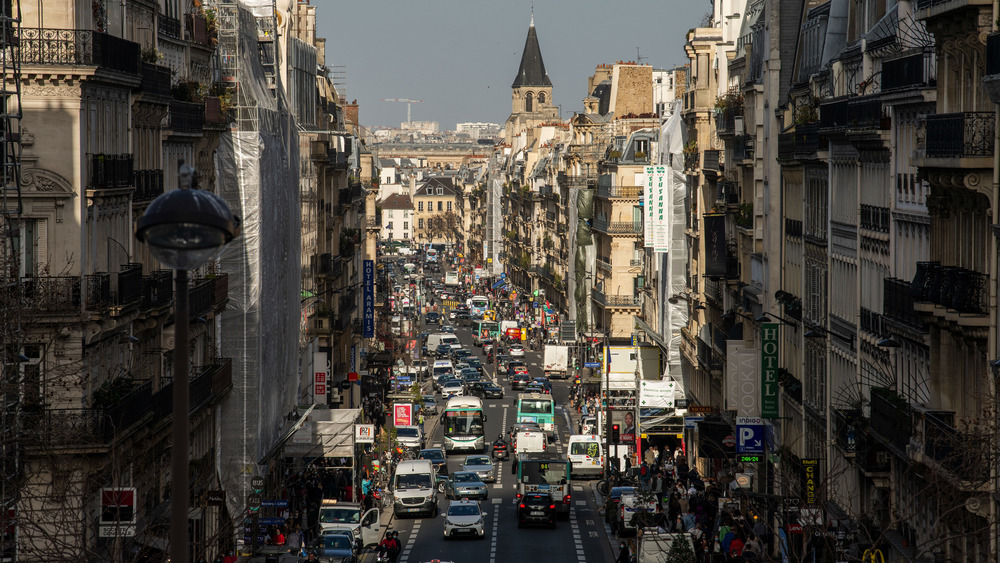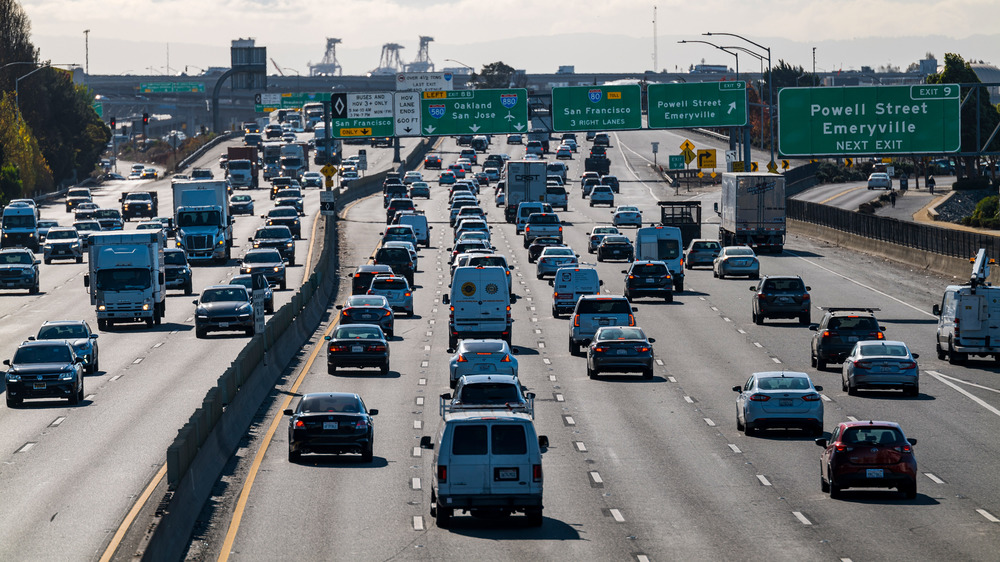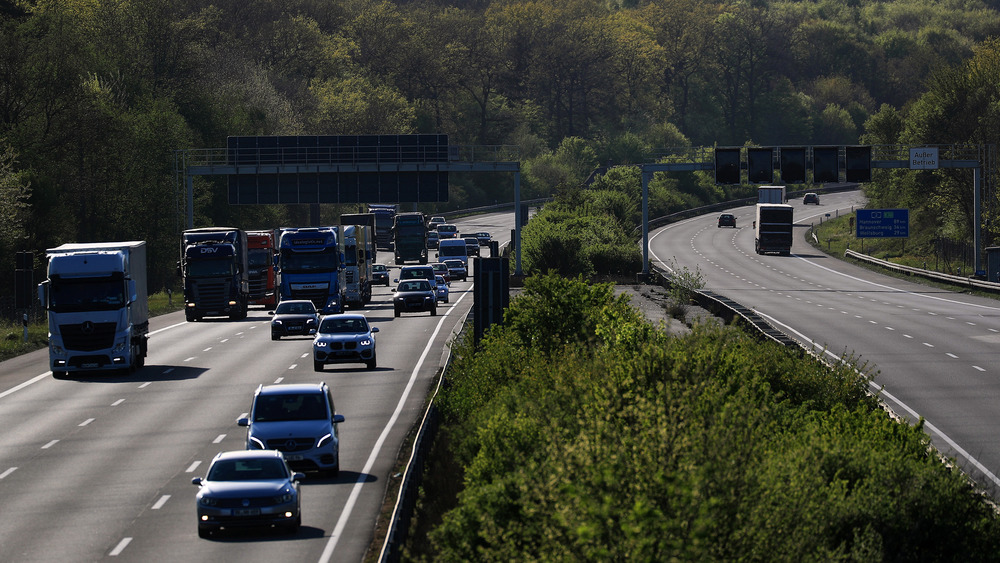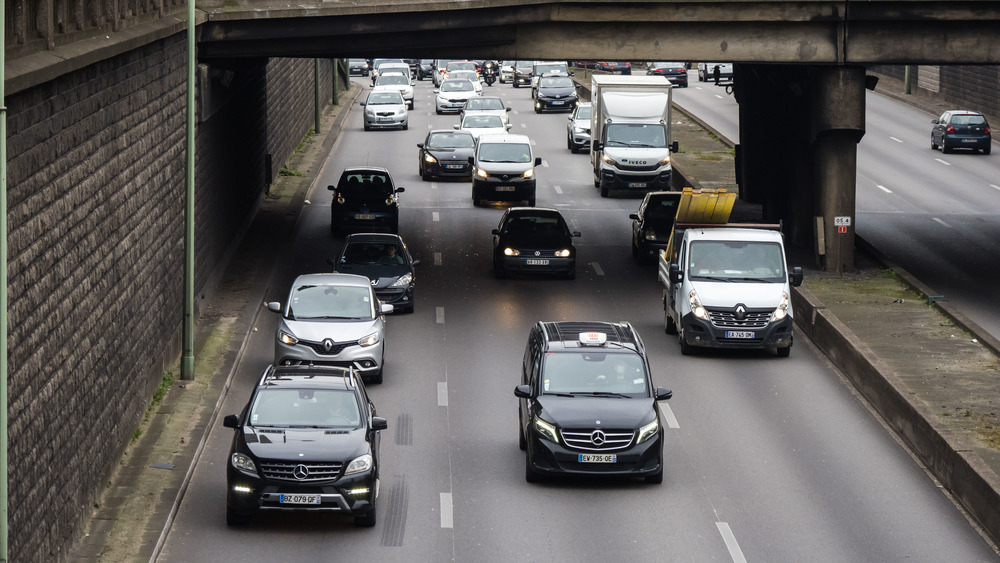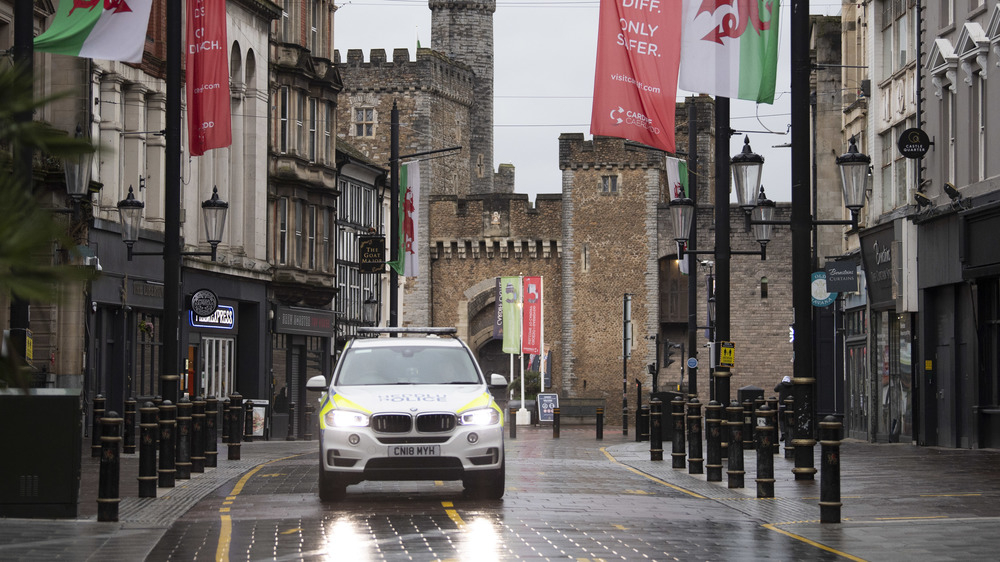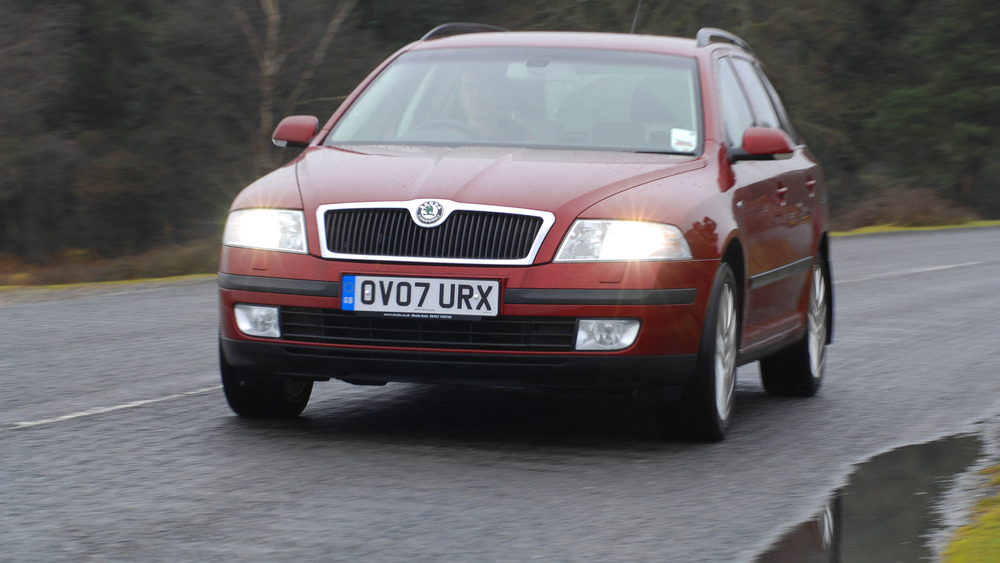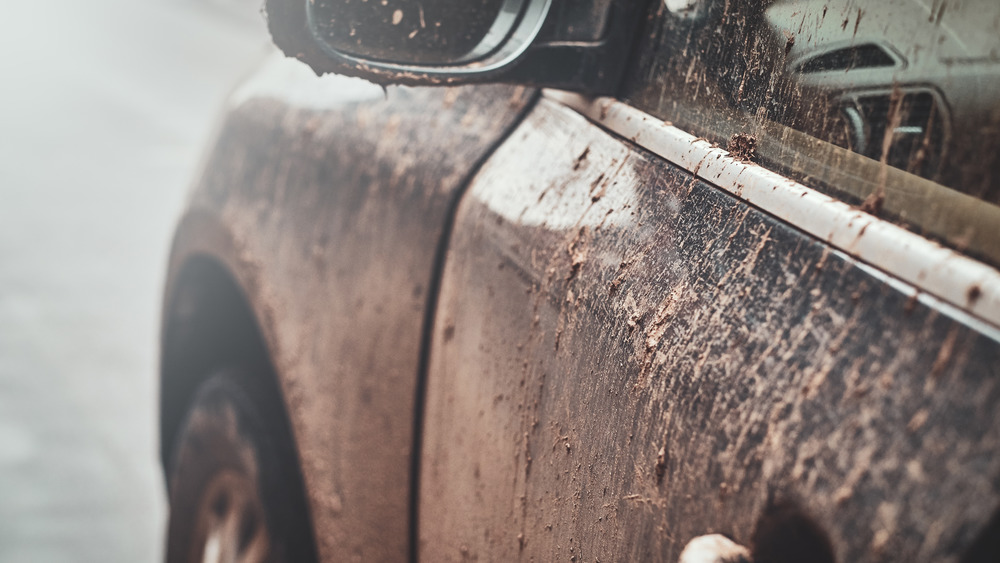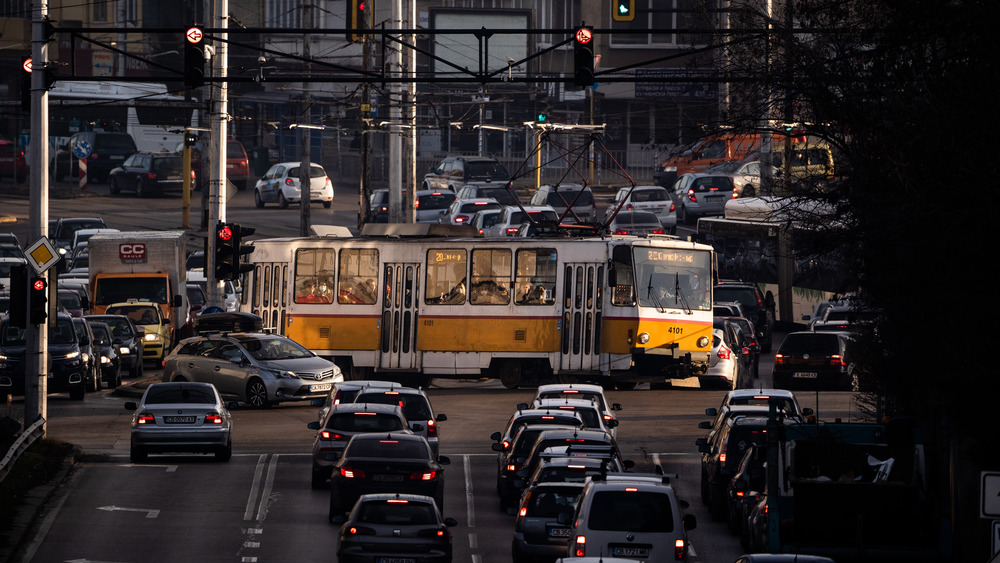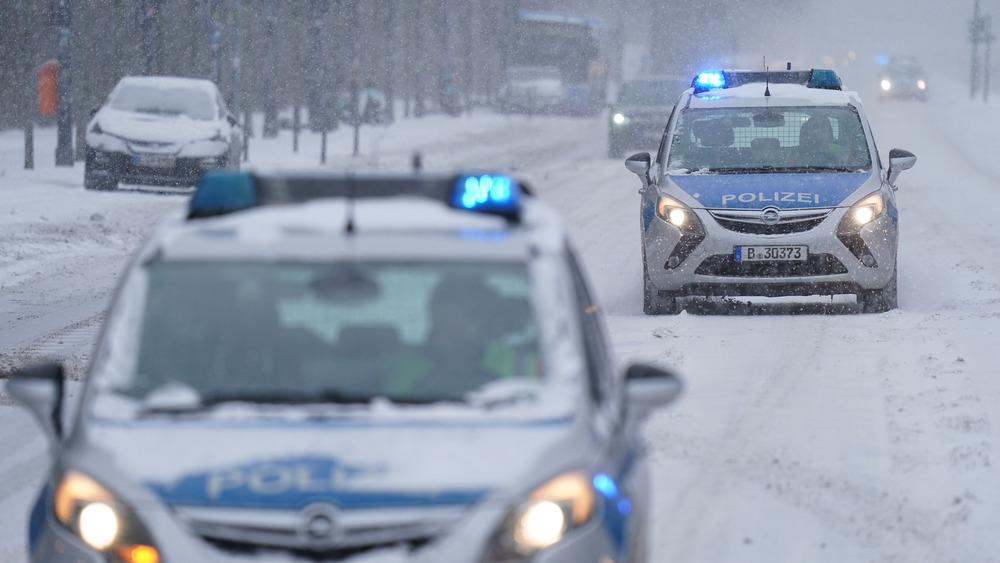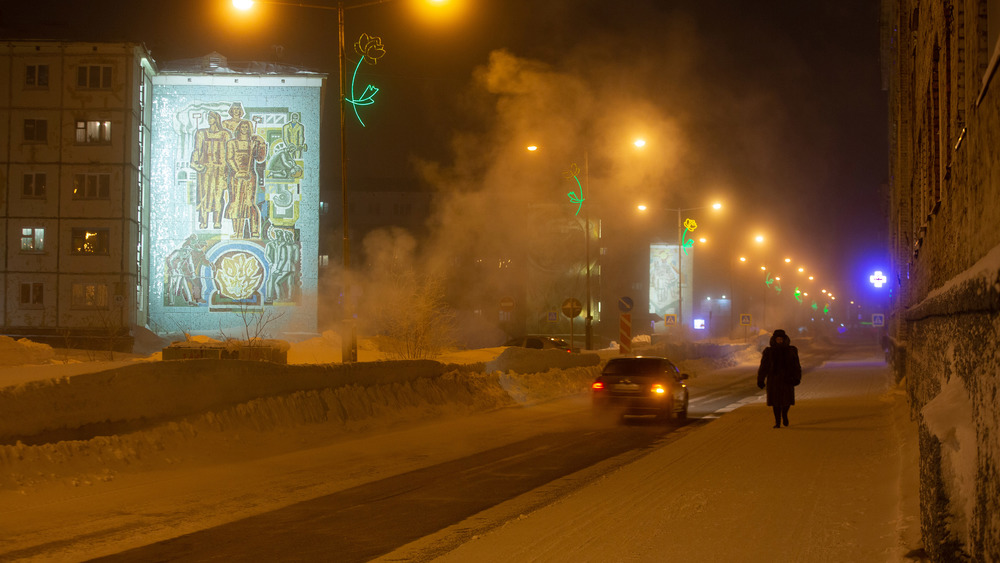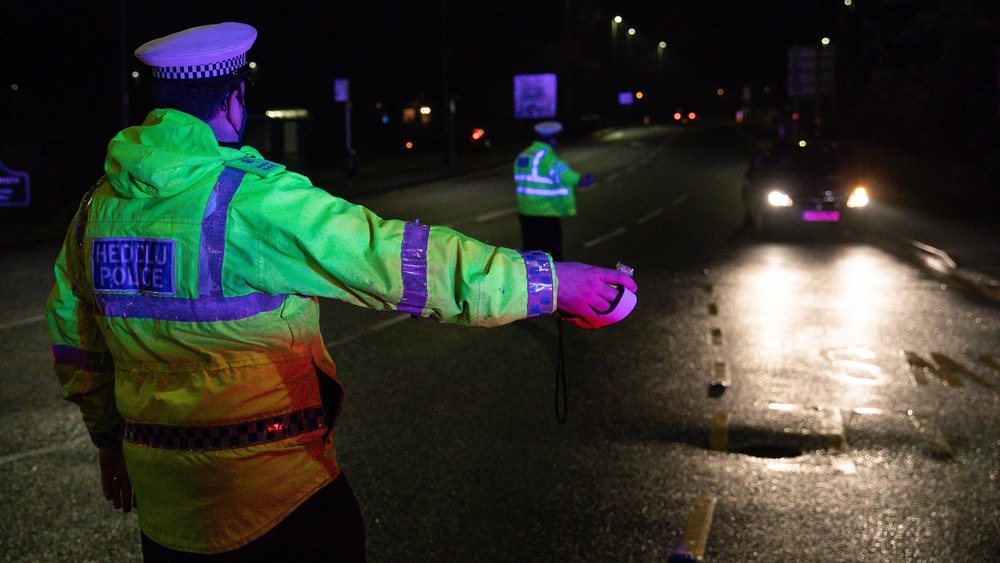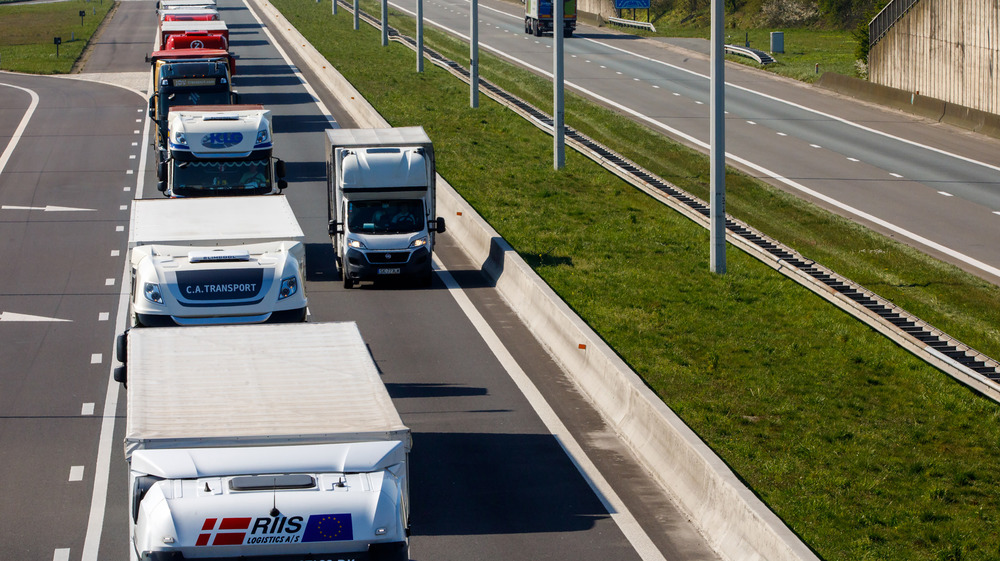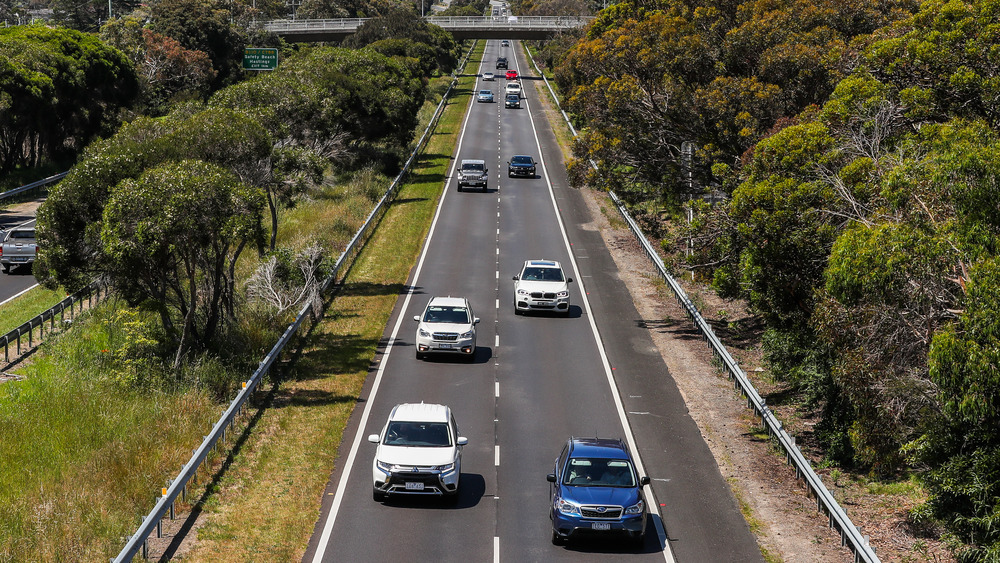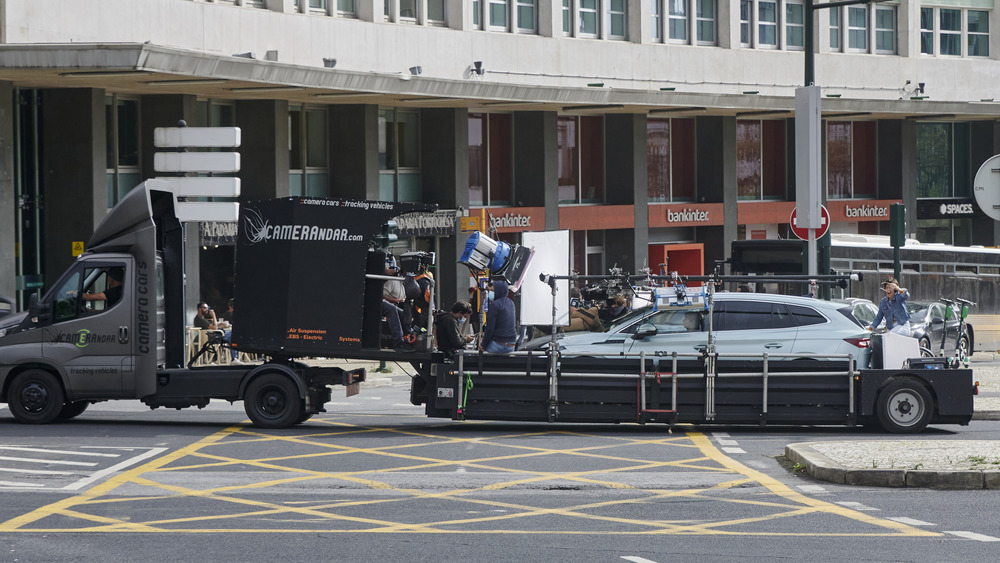Bizarre Traffic Laws Europeans Have To Follow
In an ideal world, traffic rules would be easy to follow and understand with little to no changes, no matter where you are navigating the roads. Unfortunately, reality is slightly different, and traffic rules almost always change depending on where you're driving. Of course, some places are a lot more rigid than the others, but there are also countries that seem a bit too liberal with their driving laws.
In Oman, for instance, if you're caught driving with a phone in your hand, you can end up in jail for ten days. And here's some salt for those wounds — you'll also have to cough up around $780 for the offense (via CNN). Sweden, on the other hand, takes a more lenient approach and believes in simply spreading awareness about the dangers associated with texting while driving.
With that in mind, it's worth remembering that no two countries are the same, and that there are some incredibly strange laws in certain parts of the world. Intrigued? Here's a look at some of the most outlandish driving rules in various European countries. Brace yourself, it's a colorful variety of laws, to say the least.
You're not supposed to indulge in food or beverages while driving in Cyprus
In Cyprus, you're not supposed to eat or drink anything when you're driving. Ever. According to Sixt, the country doesn't let its drivers get away with certain liberties, such as being distracted on the road and consuming food. As pointed out by The Huffington Post, even if you find yourself parched and desperately in need of water, you simply cannot quench your thirst behind the wheel.
And if you do decide to throw caution to the wind and get caught in the act, you'll be up for a hefty fine — about €85, which is approximately $103. Not quite worth the trouble after all, huh? Another thing that is unique to Cyprus? Rude behavior. Even if you find yourself feeling super irate while dealing with another pesky driver, you shouldn't raise your hand or make a threatening gesture. Doing so can land you in trouble and attract a heavy fine.
Germany has the need for speed
Driving in Germany isn't a simple or straightforward activity. While speed limits vary depending on where you are in the country, for the most part, you'll find that there really are no speed limits on the Autobahn. As reported by NPR in January 2019, the German government considered adding speed limits to certain parts of the Autobahn to help restrict carbon emissions. However, the proposal fell through and didn't make the cut because officials believed that there are better ways to control carbon emissions.
For a realistic picture, consider the fact that driving on the Autobahn without a speed limit is fairly scary and overwhelming if you're not used to it. Actor Tom Hanks once spoke about this and said on the Late Show With David Letterman, "No matter how fast you're driving in Germany, someone is driving faster than you. When another car passes you when you're driving as fast as physics allow ... a blur goes past you."
You have to be extra careful in Denmark
If you find yourself on the streets of Denmark, it's necessary for you to be extra observant at all times. Even when you're not driving. As reported by Complex, the country has a law that's fairly obvious at first but exists for a reason. Basically, before you start your car in Denmark, you must look underneath to ensure that there's nobody there.
This may or may not be a joke. A curious Quora user asked others to chime in with their opinions. A respondent wrote, "We do not even know the context of this law — is it part of standard road law like 'the driver has to assure safe working conditions before starting the car'..."
They added that it's possible that someone may have actually hurt another person many years ago, and now the law exists to prevent that from happening ever again.
In France, you need to be vigilant
France, especially Paris, is supposedly one of the most trickiest places to drive in. According to Huffington Post, things are generally tough there even in terms of something as simple as finding a parking spot. While driving in the city, you'll find that there isn't a lot of space but stiff competition as many people end up vying for the same spot. Another interesting tidbit? In the past, a rule made it compulsory for all drivers in the country to carry a breathalyzer with them. For real.
According to The Local, this law was removed in 2020, but many places still sell breathalyzers. Why? Drinking above the permissible limit and driving is frowned upon in the country. In order to combat that problem, the French government directed everyone to store breathalyzer kits in their vehicles. Disobeying the law could potentially attract a fine. You see, drinking and driving remains a serious problem in the country, and the government has been trying to find ways to combat it effectively. By the way, if you're considering using a breathalyzer on French roads, remember that it's best to try it out an hour after you stop drinking for the most accurate results.
Be kind in the U.K.
If you are in the United Kingdom, you're required to be considerate on the streets. In fact, if you're found being irksome on the streets and doing something unruly, such as splashing water on pedestrians while driving, you're likely to face serious consequences. According to the Independent, if someone is found guilty of deliberately splashing water on others while driving, they can be forced to cough up a hefty fine (around $7,000).
This is fairly serious business, in case you were wondering. A representative for a car insurance company called RAC made his stance clear on the topic when he said, "Anyone unfortunate enough to have suffered a drenching by an inconsiderate motorist splashing them when driving through a puddle would probably welcome a sizeable financial penalty for the driver."
These comments were released around the time when the country was fighting Hurricane Lorenzo in 2019, and drivers were advised to be extra careful on the roads in order to avoid accidents and any untoward incidents.
Check your car lights in Scandinavia
In some parts of Scandinavia, you're required to ensure that you keep your car lights on even during the day so that pedestrians on the street are alerted of your presence. According to the European Commission, Daytime Running Lights (DRL) were made compulsory for new cars in 2011. Back then, European Commission Vice President Antonio Tajani said, "Daytime running lights will make an important contribution to our goal of reducing casualties on European roads."
While the idea of DRL may seem odd at first, officials have a good reason for believing in them. Research indicates that DRL really can reduce accidents on the streets as other drivers as well as pedestrians can spot DRL faster than other lights. Plus, the lights turn on by themselves when you're running the engine, which means that you don't need to worry about switching them on by yourself.
Clean your car in these countries
You're only human, and it's understandable if you forget to get your car washed sometimes, right? Perhaps you've had a really busy week or simply didn't feel energetic enough to make your way to the car wash. This is usually alright, but not if you're in Belarus, Romania, or Russia. All three countries frown upon dirty cars and have fines in place for those who refuse to follow the rules.
According to Complex, Russia is fairly upfront with its demands, though. You see, you'll only be fined if your car is so filthy that nobody can decipher the license plate. However, traffic cops are strict in general and may stop you anyway, depending on how they feel about your driving skills, as per experienced drivers on Lonely Planet. A commentator wrote on a thread, "By dirty cars, I think they mean that the license plate is not legible... the road police in Russia don't need any reason to stop you and if they want they can always find a reason to fine you for something."
When in Bulgaria, be prepared
If you're in Bulgaria and are driving, you've got to shop beforehand to make sure that you don't miss out on any items on the list. What list, you ask? Well, the Bulgarians require you to carry several items with you in your car in case you're forced to deal with an emergency. As reported by Complex, the Bulgarians need you to purchase items like a first-aid kit and wait for it...a fire extinguisher.
There is more. You must also carry items like a reflective vest and a "red warning triangle.'" As per Culture Trip, there's a lot more to keep in mind if you plan to drive on Bulgaria's streets. For example, you need to make sure that your car has a vignette sticker. These show that the driver has paid the appropriate fees for use of the highways. And yes, you need to buy it yourself. You can even choose how long you need a sticker for — a day, for weeks, or even months. Again, this is important to follow because traffic officials are always on the lookout for those breaking the rules. Better to be safe than sorry, right?
Be ready to fight snow in Europe
Winter may be blissful in many ways, but it's also a bit of a hindrance. According to Deutsche Welle, countries such as Austria, Estonia, Iceland, Finland, and more ask their drivers to be mindful of winter-appropriate gear on the roads. Yes, this means that you need to get yourself snow tires. A few other countries don't actually make it compulsory for drivers to use these tires but you know, it's usually a good idea for the sake of your well-being on treacherous roads.
And as per Autotraveler, some countries even ask their citizens to use winter tires all the time, to be safe. Snow chains are also recommended for extra safety. Additionally, studded tires are forbidden in some parts of Europe, such as Poland, Romania, Czech Republic, Slovakia, Hungary, Bulgaria, Turkey, Germany, the Netherlands, and Portugal. These measures may not make much sense at first, but they do help ensure the safety of your co-passengers and others on the streets.
Russia wants you to be safe
Hitchhiking is a quintessential part of travel for many of us. However, if you're in Russia, you may realize that it's quite difficult to get a ride on your journey. As per The Telegraph, drivers are not permitted to offer rides to hitchhikers in the country because it is technically illegal. Also, Russia can be a tough place to drive in if you're not used to chaos. Plus, traffic is a big part of life in Russia.
In fact, as per Expatica, Russians have learned how to adapt to the traffic situation in their country and can be found simply snacking, texting, reapplying makeup, and more, while on the road. The rules may unique but are also fairly basic and require all drivers to be 18 or older. Well, that makes sense considering how overwhelming it can be to drive in the country if you're just starting out and aren't sure what to expect.
Alcohol is prohibited in these countries
While a few countries are relatively lenient as far as alcohol consumption is concerned, others ban it completely and forbid you from driving if you've consumed a drink or two. For example, in Hungary, Estonia, and Slovakia, the alcohol consumption limit is zero. No exceptions. According to Driver Knowledge Tests, a few countries have slightly tweaked their rules, such as Italy, where you can't drink and drive if you're under 21 and have driven for less than three years. Macedonia does something similar and stops its drivers from drinking for two years after they first get their license.
Two countries, Denmark and Poland, will slap you with a prison sentence if you're found driving with high alcohol levels. The maximum amount that's allowed is 0.02% in Denmark. Poland, on the other hand, is slightly higher at 0.05%. Another interesting tidbit? Albania makes it mandatory for everyone to travel with first aid kits, and the maximum alcohol limit is just 0.01%.
Carry your extra glasses in Spain
In some European countries, you're required to make sure that you have an extra pair of glasses if you wear them. As reported by Deutsche Welle, your driving license in Spain will indicate whether you need to wear glasses in order to be able to drive safely. It's best to keep an extra pair handy just in case you accidentally break the pair you already have or run into an unexpected accident.
As per Sixt, this rule is also applicable in a few other places like Portugal and Switzerland. Portugal, by the way, has another interesting rule. You cannot have cans of petrol in you car. And yes, to avoid a disaster, what you can do is make sure that your car is always equipped with fuel. This way, you don't need to worry about driving in distant parts of the country where you may not find gas stations easily.
Don't wear your headphones in France
If you're in France, it's important for you to make sure that you don't wear your headphones while driving. According to The Local, wearing earphones or headphones while on the road is a safety hazard and won't be tolerated. The mandate was issued in 2015. A statement from the Interior Ministry reads, "The aim is to stop drivers from getting isolated from their exterior environments, and from losing their concentration due to the use of headphones."
If you're found guilty of violating the law, you'll be forced to cough up a fine of €135 or around $162. Many applauded the rule, feeling that something like this can really help prevent fatalities and accidents on the road. Pierre Chasseray, who leads an organization called 40 Million d'Automobilistes, said, "We can't deny that using headphones while driving disturbs the concentration of the driver. It means they are effectively using the mobile phone, whether it's to dial a number or hang up."
Interestingly, this rule is applicable for even those riding a bicycle in the country. Other rules include avoiding certain types of tinted windows for front windows for extra security.
Don't strap a bike to the back of your car in Portugal
In Portugal, you're not allowed to add bicycles to the back of your car. According to Hot Cars, you cannot strap something like a bicycle rack to your car, which means that it has to fit inside your vehicle. This is especially irksome if you're someone who loves to travel and enjoys the outdoors, hoping to fit everything into your car before taking off on your next adventure.
While you can't add something with two wheels to the back of your car, you can get creative and find a way to attach your bike to the roof of your car instead (via Afar). A roof rack is permissible and can help alleviate additional stress while traveling. Another interesting rule that is unique to Portugal – speed limits. If you're found violating those, you'll be fined on a sliding scale and can expect to pay anything between €300 to €2,500 ($362 to $3,000). Additionally, the speed limits vary quite a bit depending on which part of the country you're in. For example, driving in rural towns requires you to stay below 55 miles per hour while urban areas allow you to stay somewhere between 31 miles and 74 miles per hour.
